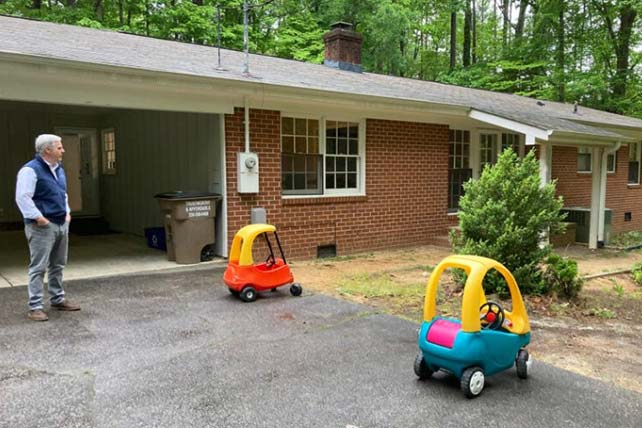The Welcome House churches partner with one of 10 U.S. refugee resettlement agencies working to house the immigrants. Those agencies are often scrambling to provide affordable housing for refugees, most of whom come to the U.S. penniless or after yearslong stays in refugee camps. The State Department typically provides only three months’ housing costs, and families must quickly find jobs to stay afloat.
Welcome House Raleigh logo. Courtesy image
“The rate of arrivals is faster than we can find long-term housing,” said Adam Clark, executive director of World Relief in Durham, one of the resettlement agencies working in North Carolina. “There has to be a temporary housing piece for this to work.”
Clark said some refugees are placed in an extended stay hotel or an Airbnb until housing is found. But those are expensive and they quickly exhaust the government’s minimal housing subsidy.
In most cases, church-owned properties are used on a temporary basis — up to 90 days — at which point the resettlement agencies typically locate to more permanent housing.
RELATED: At Milwaukee Church, Refugees Find Welcome From a Less Suspicious Time
But some churches, such as Hayes Barton Baptist Church in Raleigh, which owns three residential homes near its church building, are also renting out properties to refugees on a longer-term lease.
Two of those homes are now occupied by refugee families — one from Morocco and one from Afghanistan (a third house is being renovated). The families pay rent at below fair market value, typically no more than 30% of the family’s monthly income.
“We have assets that are sitting here and there are people coming into our community that need housing,” said Kristen Muse, senior associate pastor at Hayes Barton Baptist. “Our congregation is a generous congregation and when they see the needs, they want to reach out and use what we have for the glory of God.”
Both families staying at Hayes Barton’s church homes are Muslim and do not attend church services. But the point of the housing is not to proselytize anyway, Muse said. Instead it’s to extend a welcome. One of the refugee children attends the church’s preschool, and the church keeps in touch and helps support the family as needs arise.
The initiative comes at a time when many older churches are rethinking how to repurpose unused buildings for the common good and at the same time cast a sustainable vision for the future.
Housing refugees is emerging as one solution — one that fits in with many churches’ larger mission of welcoming the stranger.
“How do we do what God wants us to do?” said Randall Austin, a member of First Baptist Church in Hillsborough, which started offering its parsonage to refugees nearly two years ago. “This is a tangible way.”
This article originally appeared here.


